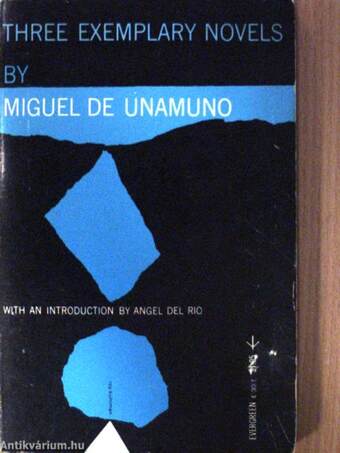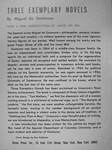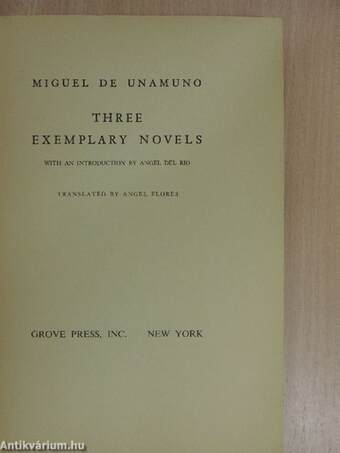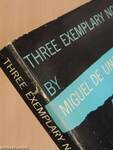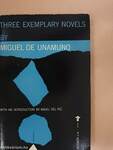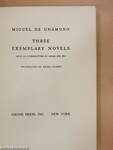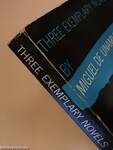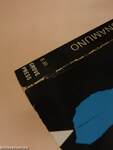1.067.339
kiadvánnyal nyújtjuk Magyarország legnagyobb antikvár könyv-kínálatát

VISSZA
A TETEJÉRE
JAVASLATOKÉszre-
vételek
Three exemplary novels
| Kiadó: | Grove Press Inc. |
|---|---|
| Kiadás helye: | New York |
| Kiadás éve: | |
| Kötés típusa: | Ragasztott papírkötés |
| Oldalszám: | 227 oldal |
| Sorozatcím: | Evergreen |
| Kötetszám: | 30 |
| Nyelv: | Angol |
| Méret: | 20 cm x 13 cm |
| ISBN: | 394-17203-5 |
| Megjegyzés: | Három mű egy kötetben. |
naponta értesítjük a beérkező friss
kiadványokról
naponta értesítjük a beérkező friss
kiadványokról
Fülszöveg
THREE EXEMPLARY NOVELS
By Miguel de Unamuno
WITH A NEW INTRODUCTION BY ANGEL DEL RIO
The Spanish writer Miguel de Unamuno—philosopher, essayist, drama-tist, poet and novelist,—is without question one of the most vigorous literary figures of our period. Well known among his works are the great Tragic Sense of Life and the növel Mist.
Unamuno was born in 1864 of a middle-class Basque family. He was an impassioned and unorthodox thinker who, in his life-long search for an individual faith and a program for the regeneration of Spain, rejected all accepted and settled beliefs. He recorded his despair, anxiety and preoccupation in numerous articles and books, yet he was alsó a man of action. Banished in 1924 for political attacks on the Spanish monarchy, he was again removed in 1936, this time by the Nationalist authorities, from his post as Rector of the University of Salamanca. He was confined to his house, where he died on the last day of the same year.
Three Exemplary Novels... Tovább
Fülszöveg
THREE EXEMPLARY NOVELS
By Miguel de Unamuno
WITH A NEW INTRODUCTION BY ANGEL DEL RIO
The Spanish writer Miguel de Unamuno—philosopher, essayist, drama-tist, poet and novelist,—is without question one of the most vigorous literary figures of our period. Well known among his works are the great Tragic Sense of Life and the növel Mist.
Unamuno was born in 1864 of a middle-class Basque family. He was an impassioned and unorthodox thinker who, in his life-long search for an individual faith and a program for the regeneration of Spain, rejected all accepted and settled beliefs. He recorded his despair, anxiety and preoccupation in numerous articles and books, yet he was alsó a man of action. Banished in 1924 for political attacks on the Spanish monarchy, he was again removed in 1936, this time by the Nationalist authorities, from his post as Rector of the University of Salamanca. He was confined to his house, where he died on the last day of the same year.
Three Exemplary Novels has been acclaimed as Unamuno's finest literary achievement. The book is composed of three intense tragedies. As in the story, "Two Mothers," we find the daemonic will of a woman running amuck in a whirlwind of maternal ürge, so in "The Marquis of Lumbria," the first story, we meet another unforgettable heroine, the hermetic Luisa, moving in the somber background of an ancient mansion and leaving a violent wake in the dense sea of tradition. In "Nothing Less Than A Man," Unamuno's most forceful piece of writing, we are introduced to Alejandro, a true Nietzschean hero.
A new introduction has been written for this edition by Angel del Rio, head óí the Spanish Department at Columbia University and a keen student and admirer of Unamuno.
Cover Design by Roy Kuhlman
Grove Press, Inc., 53 East llth Street, New York, New York 10003 Vissza
Témakörök
- Idegennyelv > Idegennyelvű könyvek > Angol > Szépirodalom > Regény, novella, elbeszélés
- Szépirodalom > Regény, novella, elbeszélés > Az író származása szerint > Európa > Spanyolország
- Szépirodalom > Regény, novella, elbeszélés > Tartalom szerint > Családregények
- Szépirodalom > Regény, novella, elbeszélés > Tartalom szerint > Lélektani regények
- Szépirodalom > Regény, novella, elbeszélés > Tartalom szerint > Kor- és társadalomrajz



